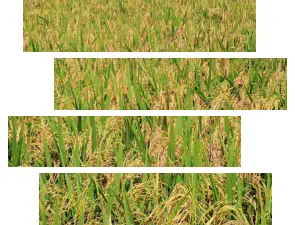Transforming Rice
Production in Africa
A Leap Towards Agricultural Independence

In an era where sustainability and self-sufficiency are paramount, Africa stands on the brink of a significant
agricultural transformation. Recent research spearheaded by the University of Nebraska-Lincoln, in
collaboration with international scientists, reveals a groundbreaking opportunity for Africa to drastically
enhance its rice production.
Currently meeting only about 60% of its demand, Africa's reliance on rice imports places it in a precarious
position. However, this new study illuminates a path toward not only meeting but surpassing this demand
through improved agronomic practices. The continent has nearly 15 million hectares of rice fields ready for
yield improvements, which, until now, remained an untapped potential due to the lack of advanced
agronomy.
The findings, supported by the Bill and Melinda Gates Foundation and published in Nature
Communications, suggest that with better land development, soil and plant nutrition, weed control, water
management, and a moderate expansion of cropland, Africa could substantially reduce its dependency on
imports. Read the full study here: https://lnkd.in/ekbvZNqR
This initiative not only aims to secure Africa's food future but also to prevent the conversion of wildlife
habitat into agricultural use. By optimizing rice yield, Africa could withstand external supply and price
shocks, like those recently experienced with India's bans on rice exports.
As we look towards 2050, with rice demand in Africa expected to more than double, the urgency for
adopting these improved practices cannot be overstated. This research is a testament to the power of
global collaboration and innovation in agronomy, offering a more optimistic future for African agriculture
and food security.
Let's celebrate the strides being made in agricultural technology and the promising future of rice
production in Africa. It's an exemplary model of how targeted research and commitment to sustainability
can pave the way for food independence on a continental scale.
For more information, visit the University of Nebraska-Lincoln news release: https://lnkd.in/eA_aeiiJ.

Service Offerings
Smallholder Financing Accessible Mechanization Post Harvest Solutions Commodity Trading Climate Smart Agriculture InclusionHead Office
Tel: +234 815 728 9590 Email: info@supertechfoods.com Web: www.supertechfoods.com Address: Plot 155, Okotie Eboh Street, Utako District, FCT Abuja.
© Copyright 2024
Transforming
Rice Production
in Africa
A Leap Towards Agricultural
Independence

In an era where sustainability and self-
sufficiency are paramount, Africa stands
on the brink of a significant agricultural
transformation. Recent research
spearheaded by the University of
Nebraska-Lincoln, in collaboration with
international scientists, reveals a
groundbreaking opportunity for Africa to
drastically enhance its rice production.
Currently meeting only about 60% of its
demand, Africa's reliance on rice imports
places it in a precarious position. However,
this new study illuminates a path toward
not only meeting but surpassing this
demand through improved agronomic
practices. The continent has nearly 15
million hectares of rice fields ready for
yield improvements, which, until now,
remained an untapped potential due to
the lack of advanced agronomy.
The findings, supported by the Bill and
Melinda Gates Foundation and published
in Nature Communications, suggest that
with better land development, soil and
plant nutrition, weed control, water
management, and a moderate expansion
of cropland, Africa could substantially
reduce its dependency on imports. Read
the full study here:
https://lnkd.in/ekbvZNqR
This initiative not only aims to secure
Africa's food future but also to prevent the
conversion of wildlife habitat into
agricultural use. By optimizing rice yield,
Africa could withstand external supply and
price shocks, like those recently
experienced with India's bans on rice
exports.
As we look towards 2050, with rice
demand in Africa expected to more than
double, the urgency for adopting these
improved practices cannot be overstated.
This research is a testament to the power
of global collaboration and innovation in
agronomy, offering a more optimistic
future for African agriculture and food
security.
Let's celebrate the strides being made in
agricultural technology and the promising
future of rice production in Africa. It's an
exemplary model of how targeted
research and commitment to sustainability
can pave the way for food independence
on a continental scale.
For more information, visit the University
of Nebraska-Lincoln news release:
https://lnkd.in/eA_aeiiJ.

Service Offerings
Smallholder Financing Accessible Mechanization Post Harvest Solutions Commodity Trading Climate Smart Agriculture InclusionHead Office
Tel: +234 815 728 9590 Email: info@supertechfoods.com Web: www.supertechfoods.com Address: Plot 155, Okotie Eboh Street, Utako District, FCT Abuja.
© Copyright 2024




























